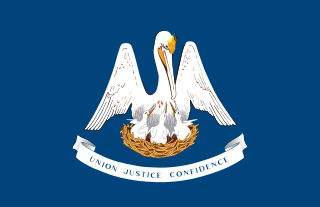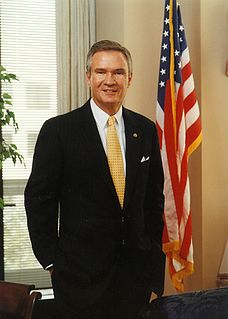
John Berlinger Breaux is an American attorney and retired politician who was a member of the United States Senate from Louisiana from 1987 until 2005. He was also a member of the US House of Representatives from 1972 to 1987. He was considered one of the more conservative national legislators from the Democratic Party. Breaux was a member of the New Democrat Coalition. After his congressional tenure, he became a lobbyist, co-founding the Breaux-Lott Leadership Group. The firm was later acquired by law and lobbying firm Patton Boggs, now Squire Patton Boggs.
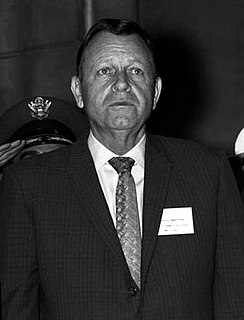
James Houston Davis was an American singer and songwriter of both sacred and popular songs, as well as a politician and former governor of Louisiana. A politician as well as a songwriter, Davis was elected for two nonconsecutive terms from 1944–48 and from 1960–64 as the governor of his native Louisiana. He ran both campaigns as a controversial advocate for impoverished and rural white Louisianians.

David Conner Treen Sr., was an American attorney and politician from Mandeville, St. Tammany Parish, Louisiana. In 1979 he was elected as the first Republican Governor of the U.S. state of Louisiana since Reconstruction. It was a sign of changing party affiliations among white conservatives in the state, who have comprised a majority of the population since at least 1900. In 1972 Treen was the first Republican elected in modern times from this state to the U.S. House of Representatives.

Murphy James Foster was a Louisiana politician who served two terms as the 31st Governor of Louisiana from 1892 to 1900. Foster adopted the Louisiana Constitution of 1898, which effectively disfranchised the black majority, who comprised most of the Republicans, thus leading to Louisiana's becoming essentially a one-party (Democratic) state for several generations and excluding African Americans from the political system.
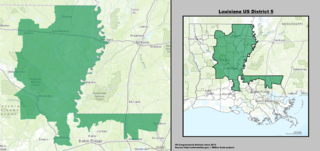
Louisiana's 5th Congressional District is a congressional district in the U.S. state of Louisiana. The district covers most of the northeastern and central portions of the state and much of the northern portions of the Florida parishes. It contains the cities of Monroe and Alexandria.

Lewis Lovering Morgan was an American lawyer and politician from Covington, Louisiana.

William Wright Heard was the 32nd Governor of Louisiana from 1900 to 1904. His governorship saw the start of the Louisiana's oil and gas industry.

The Louisiana gubernatorial election of 1959–60 was held in two rounds on December 5, 1959, and January 9, 1960. After an election which featured some of the most racially charged campaign rhetoric in Louisiana political history, Jimmie Davis was elected to his second nonconsecutive term as governor after defeating the Republican candidate, Francis Grevemberg, in the general election.
James Joseph Donelon, III, known as Jim Donelon, has been since February 15, 2006, the Republican insurance commissioner of the U.S. state of Louisiana.

The Louisiana gubernatorial election of 1932 was held on January 19, 1932. Like most Southern states between the Reconstruction Era and the Civil Rights Movement, Louisiana's Republican Party had virtually no electoral support. This meant that the Democratic Party primary held on this date was the real contest over who would be governor. The election resulted in the election of Oscar K. Allen as governor of Louisiana. Louisiana was one of only two states that held the election on a date other than the first Tuesday following the first Monday of November.

The Louisiana gubernatorial election of 1920 was held on April 20, 1920. Like most Southern states between the Reconstruction Era and the Civil Rights Movement, Louisiana's Republican Party had virtually no electoral support. This meant that the Democratic Party primary held on January 20 was the real contest over who would be governor. The election resulted in the election of John M. Parker as governor of Louisiana.

The Louisiana gubernatorial election of 2007 was held on October 20. The filing deadline for candidates was September 6. On the day of the election, all 12 candidates competed in an open jungle primary. With all precincts reporting, Bobby Jindal won the election with 54%.
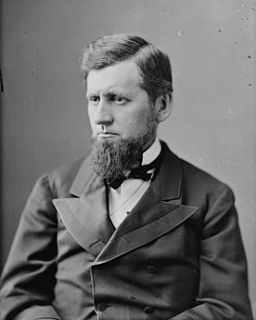
The United States Senate elections of 1900 and 1901 were elections in which the Democratic Party gained two seats in the United States Senate, and which corresponded with President William McKinley's landslide re-election. By the beginning of the next Congress, however, the Republicans gained five additional seats, giving them a ten-seat majority.

The Louisiana gubernatorial election of 1908 was held on April 21, 1908. Like most Southern states between Reconstruction and the civil rights era, Louisiana's Republican Party had virtually no electoral support. This meant that the Democratic Party primary held on January 28 was the real contest over who would be governor. This election marked the first time Louisiana used primaries to nominate party nominees. The election resulted in the election of Democrat Jared Y. Sanders, Sr. as governor of Louisiana.

The Louisiana gubernatorial election of 1904 was held on April 19, 1904. Like most Southern states between Reconstruction and the civil rights era, Louisiana's Republican Party had virtually no electoral support. As Louisiana had not yet adopted party primaries, this meant that the Democratic Party convention nomination vote was the real contest over who would be governor. The election resulted in the election of Democrat Newton C. Blanchard as governor of Louisiana.

The Louisiana gubernatorial election of 1896 was held on April 21, 1896. Like most Southern states between Reconstruction and the civil rights era, Louisiana's Republican Party was virtually nonexistent in terms of electoral support. As Louisiana had not yet adopted party primaries, this meant that the Democratic Party convention nomination vote was supposed to be the real contest over who would be governor. However, the Republicans and Populists put forward a joint candidate, John N. Pharr. With combined Republican and Populist support Pharr garnered 43% of the vote, although the Democratic nominee, Murphy J. Foster was elected with 57% of the vote.

The Louisiana gubernatorial election of 1892 was held on April 19, 1892. Like most Southern states between Reconstruction and the civil rights era, Louisiana's Republican Party was virtually nonexistent in terms of electoral support. In addition, the Republican Party had split into two factions, each supporting a different candidate. As Louisiana had not yet adopted party primaries, this meant that the Democratic Party convention nomination vote was supposed to be the real contest over who would be governor. At the convention, pro-lottery former Governor Samuel D. McEnery was nominated. As a result of the nomination of a pro-lottery candidate, a group of anti-lottery Democrats nominated their own candidate, State Senator Murphy J. Foster. In addition to the four candidates already mentioned, the increasingly popular Populists nominated R. H. Tannehill and their candidate. Despite all of this, Senator Foster was elected with 45% of the vote with a comfortable 19% margin between him and McEnery, who placed second. This election marked the last time until 1979 that the official Democratic Party nominee was defeated.

A general election was held in the U.S. state of Louisiana on October 24, 2015. All of Louisiana's executive officers, and both houses of the Louisiana State Legislature were up for election. Under Louisiana's jungle primary system, all candidates appeared on the same ballot, regardless of party and voters voted for any candidate, regardless of their party affiliation. Since no candidate received a majority of the vote during the primary election, a runoff election was held on November 21, 2015 between the top two candidates in the primary. Louisiana is the only state that has a jungle primary system.

